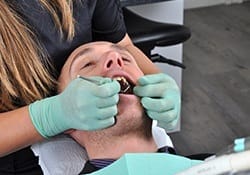Root Canal Therapy in Downers Grove

Why Would I Need a Root Canal?
Root canals are necessary when decay and damage access the pulp layers of the tooth where the nerve is housed. When damaged structures access the nerve tissue, the result can be severe pain and sensitivity, and root canals allow us to remove the damaged structures and save the tooth from extraction.
What Symptoms Should I Look For?

We will be happy to assess your situation and help you determine whether or not you need a root canal when you reach our office. However, we do see the majority of patients in need of root canal on an emergency basis, so it’s important for you to reach out to our team if you experience any combination of the following warning signs:
- Severe toothache that may be a dull, constant throb or sharp pain when biting down
- Dental sensitivity that lingers following exposure to heat or cold
- Discoloration of the tooth, usually dark coloring near the gum line
- Inflammation or infection in the gum tissue
- Other signs of infection, including fever
How are Root Canals Performed?

Root canals are actually very straightforward procedures. We begin by drilling a small access hole from the top of the tooth into the pulp layer. Then, we remove the damaged pulp and nerve tissue. The tooth is refilled, and the access hole is sealed shut. For the majority of patients, we will also place a custom dental crown restoration. Once in place, your dental crown will strengthen and protect the remaining healthy tooth structure. In some cases, we may also need to provide oral or topical antibiotics to remove infection before we complete your treatment.
Do I Need to Change My At-Home Hygiene Routine?
Immediately following your root canal, you may want to avoid chewing on that side of the mouth and take extra care when brushing and flossing around the tooth, which may be sensitive for a few days after your root canal. Once the minimal irritation or inflammation subsides, you should be able to brush and floss as usual. If you have a porcelain crown protecting your root canal treated tooth, you may want to switch to a softer toothbrush and minimally abrasive toothpaste to avoid excessive wear. Using a waxed floss may also be beneficial to avoid snagging or pulling around the crown.
Understanding the Cost of Root Canals

If you have a tooth that is infected or severely damaged, extraction may not be the only option. Root canal therapy can be used to save teeth from being pulled. However, you may have some concerns regarding the cost of your treatment. During your consultation, we can discuss the cost of your treatment in detail. Until then, here are some things to take into consideration.
Factors That Can Affect Root Canal Cost

We aren’t able to determine the exact cost of your root canal treatment until you see us in person. That’s because there are different factors that contribute to the cost. Here are the most prominent ones:
- Location: Depending on where the affected tooth is located in your mouth, the cost will vary. This is due to the molars having more roots than the teeth in the front of your mouth, so they take longer to treat.
- Difficulty: The more complicated a procedure is, the higher the cost.
- Additional Treatments: If you are in need of another service, like a dental crown, in addition to your root canal treatment, this cost should also be taken into consideration.
Is it Cheaper to Pull My Tooth?

Many patients feel tempted to skip the whole root canal process to just have their tooth extracted. The cost of an extraction may be cheaper upfront, but it’s important that you consider the long-term consequences of losing a natural tooth. Your bite can become negatively impacted as the surrounding teeth shift out of place, resulting in difficulty chewing and general discomfort. To prevent this, you would need to replace your missing tooth with a dental bridge or dental implant. The cost of these tooth replacement options can add up quickly. Ultimately, a root canal is likely the most cost-effective way to address an infected tooth. You shouldn’t put off a root canal either. By waiting too long, you could end up requiring an extraction to preserve the health of the rest of your smile.
Does Dental Insurance Cover Root Canal Treatment?

Root canal treatment is usually considered by dental insurance companies to be a major restorative procedure. This type of treatment is generally covered at about 50%. Just keep in mind that every plan is different, so it’s best to confirm this information with your provider so you don’t run into any surprises. At Esplanade Dental Care, we are proud to be in-network with numerous popular dental insurance providers, including Delta Dental, Cigna, Aetna, Humana, United Healthcare, Blue Cross Blue Shield, and more!
Other Options for Making Root Canal Treatment Affordable

If you don’t have dental insurance, this doesn’t mean that you will be left completely on your own. At Esplanade Dental Care, we are happy to accept payments through CareCredit – a third-party financing company that can split the cost of your treatment into manageable monthly installments with little to no interest. To learn more about your financial options, don’t hesitate to reach out to one of our friendly team members.
Root Canal FAQs
How Much Pain Is Normal After a Root Canal?
Thankfully, you’ll be numbed and/or sedated for the procedure itself, so you shouldn’t feel any potential discomfort until the medications wear off. Then, you can expect to have some mild discomfort and sensitivity, but these symptoms are temporary. The peak of the pain tends to happen on the third day after your procedure and then begins to fade.
It’s usually safe to take over-the-counter painkillers like Tylenol or ibuprofen to address any aches or inflammation. You might also want to steer clear of any overly hard, sugary, sticky, spicy, or hot foods that can exacerbate any issues you may have.
If you have pain that doesn’t subside or gets progressively worse after a week, please contact us right away so we can ensure you haven’t developed an infection.
Can I Eat Before a Root Canal?
In most cases, it’s recommended that you eat a healthy meal a couple of hours before you arrive at our office for your root canal. Your mouth will likely still be numb after the fact, which can make it harder to eat. However, if you’re going to be more heavily sedated, you might be asked to fast ahead of time to reduce the risk of nausea.
You should also avoid ingesting alcohol for 24 hours before your appointment because it can impact the local anesthetic that’s used to numb your mouth to keep you calm and relaxed.
How Long Do Root Canals Last?
This procedure allows our dentists to preserve and protect your natural tooth when it’s injured and might otherwise require extraction and replacement. Thankfully, teeth that have been treated with this therapy can potentially last the rest of your natural life.
That said, there are some circumstances that might require repeat treatment. If your restoration or the tooth underneath it is damaged, bacteria can reinfect it. This can lead to another root canal to once again clear away the injured materials and preserve its functionality. Our dentists will give you specific post-op instructions to follow that can prevent this later, so it’s important to follow their orders in detail.
Do I Need Antibiotics Before or After My Root Canal?
Although antibiotics can usually effectively treat bodily infections, they’re less effective when it comes to your teeth. These medications work by traveling through your bloodstream to target the infected area, but these internal pathways don’t reach the pulp inside of your teeth. That means they’re not an effective way to eliminate any disease there.
If you have a health condition that increases your risk of developing an infection after a major procedure, you might be given antibiotics afterward. Our team will review your medical history and list any current prescriptions you’re on to ensure that we don’t do anything that could put your overall health at risk.

